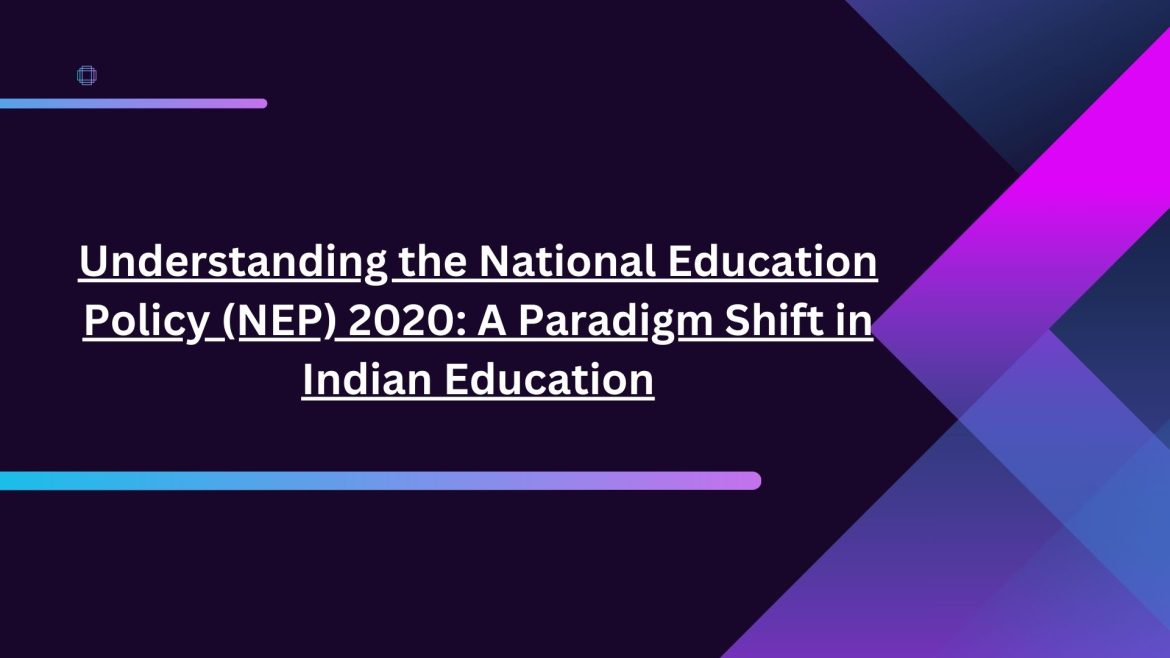The National Education Policy (NEP) 2020 heralds a significant transformation in the Indian education landscape. This comprehensive policy aims to modernize and overhaul the system to meet the needs of the 21st century. Introduced by the Government of India, NEP 2020 seeks to create an education framework that is flexible, multidisciplinary, and inclusive. It focuses on the holistic development of students. Let’s delve into the key features, objectives, and potential impacts of NEP 2020.
Key Features of NEP 2020
1. 5+3+3+4 Curriculum Structure
NEP 2020 introduces a new structure to replace the traditional 10+2 system. This new structure aligns more closely with the cognitive development stages of children:
- Foundational Stage (5 years): This includes 3 years of preschool/Anganwadi followed by Grades 1-2. It focuses on play-based and activity-based learning.
- Preparatory Stage (3 years): This covers Grades 3-5 and emphasizes discovery and activity-based interactive classroom learning.
- Middle Stage (3 years): This encompasses Grades 6-8 with experiential learning in sciences, mathematics, arts, social sciences, and humanities.
- Secondary Stage (4 years): This consists of Grades 9-12, encouraging greater depth, critical thinking, and subject choice flexibility.
2. Multilingualism and the Mother Tongue
The policy emphasizes the importance of instruction in the mother tongue or regional language up to at least Grade 5, and preferably until Grade 8. This approach aims to strengthen cognitive development and cultural connections. It also promotes multilingualism.
3. Holistic and Multidisciplinary Education
NEP 2020 promotes a broad-based, multidisciplinary, and holistic education framework. It integrates arts, sciences, vocational skills, and sports into the curriculum. The goal is to develop well-rounded individuals with critical thinking, creativity, collaboration, and communication skills.
4. National Mission on Foundational Literacy and Numeracy
Recognizing the critical importance of early literacy and numeracy, NEP 2020 sets an ambitious goal. It aims to ensure all students attain foundational literacy and numeracy by Grade 3. This mission seeks to bridge learning gaps and ensure foundational skills are achieved early.
5. Assessment Reforms
The policy advocates for regular and formative assessments instead of high-stakes exams. It introduces a 360-degree holistic progress card. This card tracks students’ development in various domains, including cognitive, affective, and psychomotor skills.
6. Teacher Education and Professional Development
NEP 2020 emphasizes high-quality teacher education and continuous professional development. It proposes a four-year integrated B.Ed. degree as the minimum qualification for teachers. The policy highlights the importance of ongoing training and support.
7. Inclusive and Equitable Education
The policy aims to provide equitable access to education for all children. It focuses especially on those from disadvantaged and underrepresented groups. Special measures support children with disabilities, girls, and children from marginalized communities. The goal is inclusivity.
8. Higher Education Reform
NEP 2020 envisions transforming higher education institutions into multidisciplinary institutions. It fosters a culture of research and innovation. The policy proposes the establishment of the Higher Education Commission of India (HECI) to oversee regulation, accreditation, funding, and academic standards.
9. Integration of Technology
The policy highlights the importance of integrating technology in education. It promotes the development of digital infrastructure, online learning platforms, and digital content. The aim is to enhance learning outcomes and accessibility.
10. Vocational Education
NEP 2020 aims to integrate vocational education into mainstream education from secondary school onwards. By 2025, it aspires to expose at least 50% of learners to vocational education. This prepares them for various career paths.
Objectives of NEP 2020
1. Universal Access to Education
A primary objective of NEP 2020 is to ensure universal access to quality education for all children. This spans from early childhood through higher education. It includes efforts to bring back dropouts and prevent students from leaving the education system prematurely.
2. Bridging the Gap Between Academic and Vocational Education
The policy seeks to create seamless integration between academic and vocational education. It recognizes the importance of skill development in the modern economy.
3. Cultivating Global Citizens
NEP 2020 aspires to develop well-rounded individuals. It aims for students to be academically proficient as well as socially and emotionally intelligent. This prepares them to be responsible global citizens.
4. Promoting Research and Innovation
By fostering a culture of research and innovation, NEP 2020 aims to position India as a global knowledge superpower. It emphasizes critical thinking, creativity, and scientific temper.
Potential Impact of NEP 2020
On Students
- Personalized Learning: With a flexible curriculum and multidisciplinary education, NEP 2020 caters to diverse needs and interests. It promotes personalized learning paths.
- Skill Development: The integration of vocational education and focus on 21st-century skills prepare students for a dynamic job market. It equips them with essential life skills.
- Holistic Growth: Emphasis on social, emotional, and ethical development fosters holistic growth. This ensures students are well-prepared for future challenges.
On Teachers
- Enhanced Professional Development: Continuous professional development opportunities will enhance teachers’ skills and knowledge. This enables them to provide high-quality education.
- Empowerment and Support: Teachers will receive greater autonomy and support. This empowers them to innovate in their teaching methods and better cater to students’ needs.
On Educational Institutions
- Quality Improvement: The introduction of a single regulatory body and accreditation norms will ensure higher standards of education across institutions.
- Multidisciplinary Approach: Institutions will adopt a more flexible and multidisciplinary approach. This promotes a broad-based education system.
On Society
- Equitable Opportunities: Efforts to include marginalized communities will promote social equity and justice. This ensures that every child has access to quality education.
- Global Competitiveness: The policy aims to make India a global knowledge superpower. This will create a workforce equipped with 21st-century skills.
Conclusion
The National Education Policy 2020 is a transformative initiative poised to revolutionize the Indian education system. By focusing on holistic development, inclusivity, and innovation, NEP 2020 promises to create an education system that is flexible, multidisciplinary, and aligned with global standards. As India embarks on this transformative journey, the successful implementation of NEP 2020 will be crucial. It will ensure that the country remains competitive on the global stage, providing its citizens with the skills and opportunities needed to thrive in an ever-changing world.




